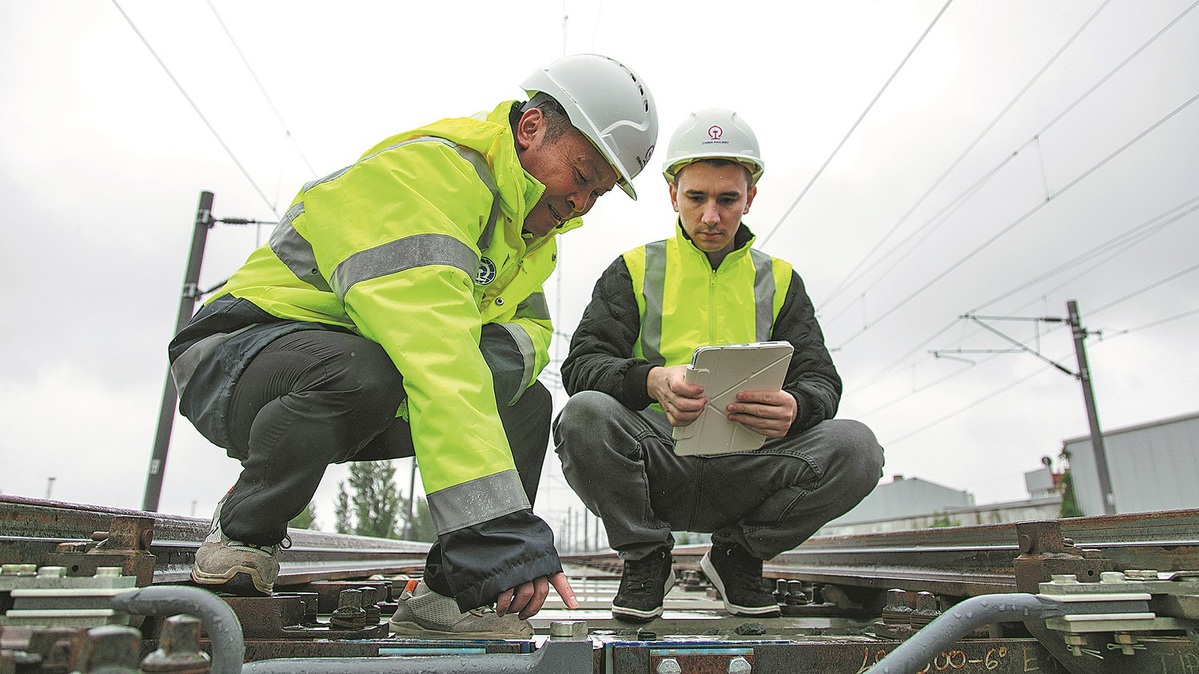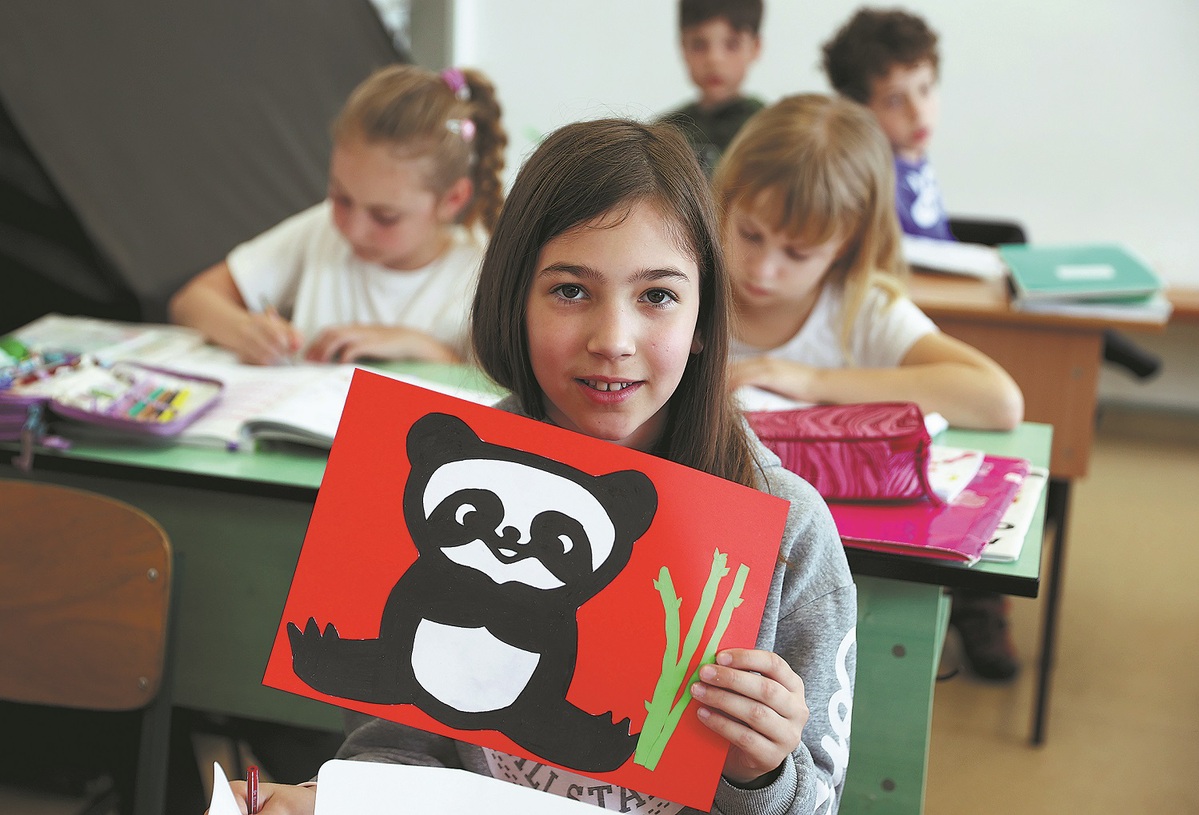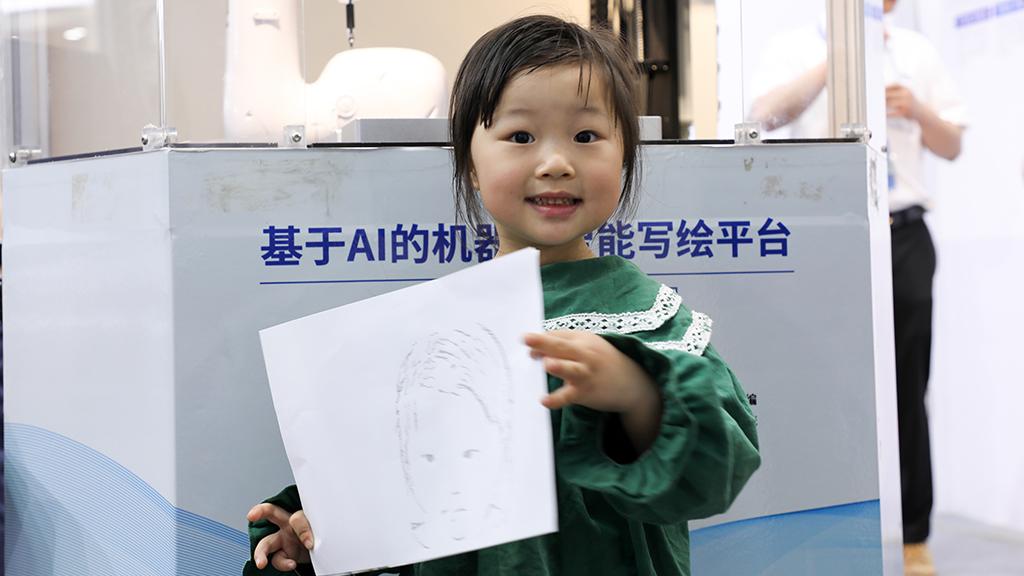Sound, stable ties needed to tackle global challenges

A performer breakdances at the national pavilion of France during the 2024 China International Fair for Trade in Services in Beijing on Sept 14. (Chen Yehua/Xinhua)
The year 2024 witnessed a series of high-level meetings between China and Europe, with more than a dozen European state leaders and senior officials paying visits and engaging in bilateral discussions with their Chinese counterparts.
In May, President Xi Jinping embarked on a trip to France, Serbia, and Hungary, strengthening China-Europe mutual trust and promoting pragmatic collaboration.
Amid the increase in high-level communications between China and Europe, senior officials and experts have urged the two sides to further their strategic dialogue and win-win cooperation, because sound and stable China-Europe relations, they emphasized, are beneficial to global prosperity and crucial to tackling global challenges.
"Europe holds an important position in China's diplomatic agenda. A healthier and more stable China-Europe relationship serves the fundamental interests of both sides and the common aspiration of the world," Chinese Foreign Minister Wang Yi said at the Symposium on the International Situation and China's Foreign Relations on Dec 17.
Calling Xi's Europe trip "historic", Wang noted its achievements: advancing the 60-year-old China-France diplomatic relationship into a new phase, reinforcing the "ironclad friendship" between China and Serbia, and elevating China-Hungary ties to an "all-weather comprehensive strategic partnership for the new era".
Peace, development, and exchanges topped the agenda of Xi's visits, which were warmly welcomed by the host countries.

Chinese and local engineers inspect a construction site of the Serbian segment of the Belgrade-Budapest Railway, in Novi Sad, Serbia, on Sept 16. (Wang Wei/Xinhua)
Historic trip
During his visit to France, Xi and French President Emmanuel Macron issued joint statements on the situation in the Middle East, on artificial intelligence and global governance, on biodiversity and oceans, and on agricultural exchanges and cooperation. Nearly 20 bilateral cooperation documents were signed in such areas as green development, aviation, agrifood, commerce, and people-to-people exchanges.
As China and France celebrated the 60th anniversary of the establishment of diplomatic ties, Macron noted that the two countries enjoy a friendly relationship and productive cooperation regarding not just cutting-edge technologies but also global issues such as climate change and marine biodiversity.
In Serbia, Xi and his Serbian counterpart, Aleksandar Vucic, together announced the building of a China-Serbia community with a shared future in the new era. Serbia became the first European country to establish such a high-level relationship with China.
Vucic acknowledged China's significant investment in Serbia to help the local economy and improve living standards. He welcomed further Chinese investments, and more direct flights, and ensured the timely completion of the Serbian segment of the Belgrade-Budapest Railway.
In Hungary, Xi held talks with Hungarian President Tamas Sulyok and Prime Minister Viktor Orban. The leaders witnessed the exchange of multiple bilateral cooperation documents on the Belt and Road Initiative, economy and trade, investment, science and technology, culture, and agriculture, among others.
In addition to the Europe visit, Xi also engaged with leaders from Germany, the United Kingdom, Spain, and Italy at meetings surrounding the G20 Summit in Brazil, and welcomed heads of European states, including Belgium, the Netherlands, Germany, Poland, Italy, Spain, Finland and Slovakia, in Beijing.
Feng Zhongping, director of the Chinese Academy of Social Sciences' Institute of European Studies, said the visits demonstrate the efforts the two sides are making to promote political mutual trust despite the challenges in China-EU relations.
European countries have realized the importance of pragmatic cooperation with China, as they are closely interconnected in terms of the economy, and such cooperation serves the interests of both sides, he said.
Luigi Gambardella, president of China-EU, a Brussels-based association promoting China-Europe business cooperation, said Italian President Sergio Mattarella's Beijing visit brought commitments to further expand trade, particularly by increasing China's imports of high-quality Italian goods.
Michael Schumann, chairman of the Board of the German Federal Association for Economic Development and Foreign Trade, praised the meeting between Xi and German Chancellor Olaf Scholz which highlighted Sino-German collaboration. Schumann said that Germany's export-driven economy has long thrived on international cooperation.
For many years, the EU had been China's largest trading partner. It became the second-largest after Brexit in 2020.
According to the European Commission, the volume of trade in goods between the EU and China accounted for 739 billion euros ($770 billion) in 2023.

A student at the Hungarian-Chinese bilingual school in Budapest shows her painting of a giant panda on May 3. (Zhao Dingzhe/Xinhua)
This year marks the 50th anniversary of the establishment of China-EU bilateral relations. Besides economic cooperation, China and Europe have often worked closely on various multilateral issues throughout the history of China-EU relations, such as global climate change governance and World Trade Organization reforms, said Jin Ling, a senior research fellow on European studies at the China Institute of International Studies.
"There is a strategic consensus among China and European countries in support of multilateralism in response to the challenges posed by (US President-elect) Donald Trump's unilateralism," said Jin, adding that strengthening multilateral cooperation has been an element in nearly all joint declarations from China-EU summits for a long time.
However, advancing a global order and fostering multilateral cooperation between China and the EU has been challenged by ideological divides and excessive geopolitical thinking in recent years.
In 2019, the European Commission published an EU-China Strategy Outlook which declared China to be a "partner for cooperation, an economic competitor, and a systemic rival".
In 2023, Ursula von der Leyen, the chief of the commission, launched a "de-risking "policy toward China.
More recently, the EU finalized a decision to place additional tariffs of up to 35.3 percent on Chinese electric vehicle imports.
A recent report by the China Chamber of Commerce to the EU found that 93 percent of surveyed Chinese companies say the EU's economic security stance has affected their operations and dented their confidence.
About 60 percent of the companies say they have felt "strong anti-China sentiment", while 64 percent say they have met unfair treatment due to their identity as a Chinese company, according to the report.
"The EU's current priority should not be asserting rule-setting in areas like trade remedies, investment screening, and industrial policies, nor attempting to impose these through instruments such as duties, fines, lawsuits, or administrative intervention upon China," said Cui Hongjian, director of the Center for the European Union and Regional Development Studies at Beijing Foreign Studies University.
"A world increasingly marked by 'geopolitical competition' and even conflicts between country groups does not serve either side's interests," he wrote for the China Think-tank Network on Europe in November.
Lu Shaye, China's ambassador to France, used the Paris Olympics as a metaphor for competition between China and Europe at a forum in Paris on Dec 17.
"Just as athletes compete to surpass their limits, nations inspire each other through mutual pursuit and progress," Lu said.
"China's success does not mean Europe's failure, and vice versa. Economic issues should be resolved through economic logic, as overly politicizing them could backfire."
Cai Run, head of the Chinese Mission to the European Union, stressed that China and Europe are "partners", not "rivals", in a commentary for Euronews on Dec 20.
"China and the EU, as two major forces driving multipolarity, two large markets supporting globalization, and two great civilizations advocating diversity, have no fundamental conflicts of interest," Cai wrote.
"The essence of China-EU practical cooperation in trade and other areas is complementary advantages and mutual benefit."
Xinhua contributed to this story.
Photos
Related Stories
- Xi stresses winning tough, protracted battle against corruption
- Senior official calls for thoroughly studying, implementing Xi Jinping Thought on Culture
- Xi, Botswana's president exchange congratulations over 50th anniversary of ties
- Xi calls for winning tough anti-graft battle
- Xi orders all-out rescue efforts following heavy casualties in 6.8-magnitude Xizang quake
Copyright © 2025 People's Daily Online. All Rights Reserved.









